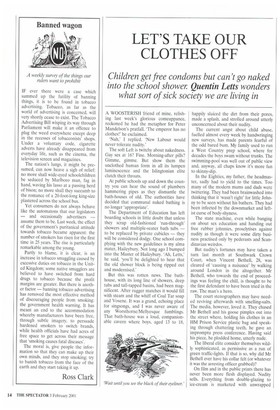Banned wagon
A weekly survey of the things our rulers want to prohibit
IF ever there were a case which summed up the futility of banning things, it is to be found in tobacco advertising. Tobacco, as far as the world of advertising is concerned, will very shortly cease to exist. The Tobacco Advertising Bill wisping its way through Parliament will make it an offence to plug the weed everywhere except deep in the recesses of tobacconists' shops. Under a voluntary code, cigarette adverts have already disappeared from everyday life, such as the cinema, the television screen and magazines.
The nation's lungs, it might be presumed, can now heave a sigh of relief: no more shall wide-eyed schoolchildren be seduced by Marlboro man, fag in hand, waving his lasso at a passing herd of bison; no more shall they succumb to the romance of a 20-foot-long king-size plastered across the school bus.
Yet consumers do not always behave like the automatons that our legislators — and occasionally advertisers — assume them to be. Last week, the effect of the government's puritanical attitude towards tobacco became apparent: the number of smokers has risen for the first time in 25 years. The rise is particularly remarkable among the young.
Partly to blame, it is clear, is an increase in tobacco smuggling caused by excessive duties on tobacco in the United Kingdom; some native smugglers are believed to have switched from hard drugs to tobacco because the profit margins are greater. But there is another factor — banning tobacco advertising has removed the most effective method of discouraging people from smoking: the government health warning. It has meant an end to the accommodation whereby manufacturers have been free, through subtle imagery, to persuade hardened smokers to switch brands, while health officials have had acres of free space to get across their message that 'smoking causes fatal diseases'.
The moral is, give people the information so that they can make up their own minds, and they stop smoking; try to banish tobacco from the face of the earth and they start taking it up.
Ross Clark


























































 Previous page
Previous page